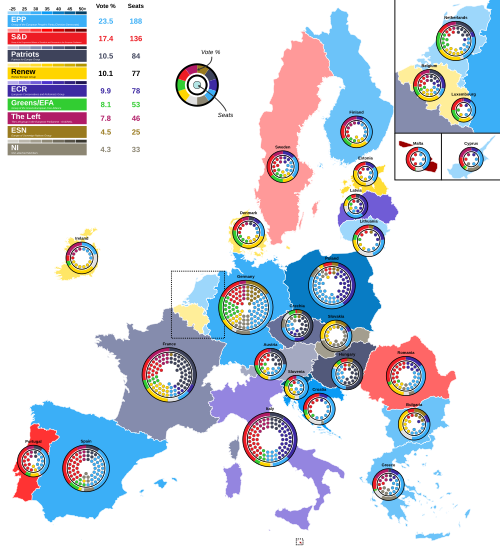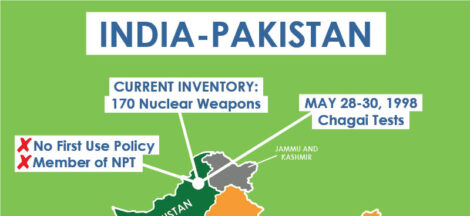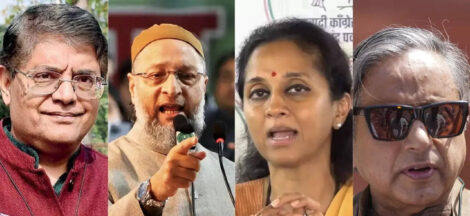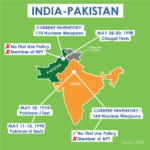By Satyaki Chakraborty
The results of the national elections held on Sunday May 18 in three countries of Europe-Portugal, Romania and Poland have given mixed signals about the political trends in the continent with Right forces consolidating in Portugal while the anti- Right combinations prevailed with narrow margins in Romania and Poland.
In Portugal with a traditional socialist and communist hold, the ruling Right combination Democratic Alliance (DA) led by the present Prime Minister Luis Montenegro got 32.1 per cent of the votes bagging the largest number of seats 86 out of the total number of 230 seats in Parliament. The Socialist Party (PS) which ruled for long before the 2022 elections got only 58 seats with 23.4 per cent of the votes while the far right Chega got also 58 seats with 22.6 per cent of the votes. The third Portuguese national elections in the last three years showed the decline of the Socialists and the surge of the far right Chega from 12 seats to 50 seats and then to 58 seats in May 18 elections.
Though the ruling DA has not got the requisite majority of 116 needed to rule alone, the DA is confident of forming a minority government like the March 2024 elections when it got only 80 seats. Like Germany, the ruling DA has refused to have any coalition with the far right Chega. This coalition of right and far right could have given the combination a total of 138 seats, a comfortable majority in the 230 member Parliament.
Chega’s leader, André Ventura, said his party’s impressive showing at the polls – well up on the 18% of the vote it took last time round – had ended 50 years of conservative and socialist governments and “killed bipartisanship in Portugal”.. Chega is targeting the supporting base of the conservatives, so the ruling DA is panicky in bringing Chega in any government headed by it. The DA leadership feels that Chega then will make use of government machinery to advance its agenda and isolate the DA leadership from its political base.
The President of Portugal will soon start negotiations for the formation of the new government. The process will continue till the month end or even the first week of June, but the continuation of the DA government once again as a minority government is a big possibility. The present government functioned well in its last fourteen month tenure without any major hiccup. The economy is performing better.
But in Romania, the far right Presidential candidate George Simion who was leading in opinion polls till the last day, lost to his rival the centrist Mayor of Bucharest Nicusor Dan who is known as a pro-EU and is liked by the European Union as a close ally in the present period of tariff war with the U.S. President Donald Trump. Dan is reported to have won by eight points over Simion highly disappointing the surging far right supporters.
The figures from Romania’s central election authority showed Dan, who had cast the second round vote as a battle between “a pro-western and an anti-western Romania”, on 54.2%, while Simion, a self-professed Trump admirer, had 45.8%. Simion has disputed the figures and has talked of contesting the results but the Romanian election authority has said there is no dispute.
In Poland, the pro-European centrist Rafał Trzaskowski and historian Karol Nawrocki, backed by the populist right, have each secured about 30% of the vote in a nail-bitingly close first round of Poland’s presidential election.
An exit poll by the Ipsos institute suggested Trzaskowski, the mayor of Warsaw and candidate from the prime minister Donald Tusk’s Civic Coalition, was narrowly ahead with 30.8% of the vote in the first round, with Nawrocki at 29.1% of the vote..Now the run-off will take place on June 1. So both the contestants will be anxiously looking for the final round with their own preparations. The difference is too narrow between the two candidates and anyone can win.
Analysts have described the Romanian election as the most important in the country’s post-communist history, with significant implications for the country’s strategic orientation and economic prospects as well as for European Union unity.
Simion won the 4 May first round, triggering the collapse of Romania’s government of centre-left Social Democrats and centre-right Liberals (PNL). The new president will nominate the next prime minister and influence the formation of a new coalition. (IPA Service)




 Pakistan’s Nuclear Threat To India Is Real
Pakistan’s Nuclear Threat To India Is Real 